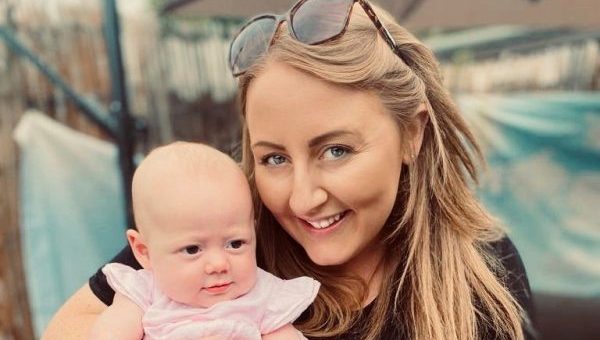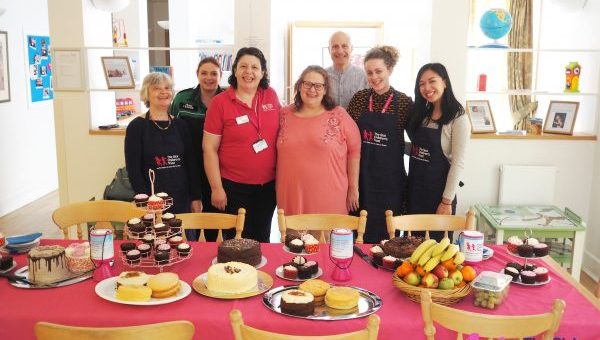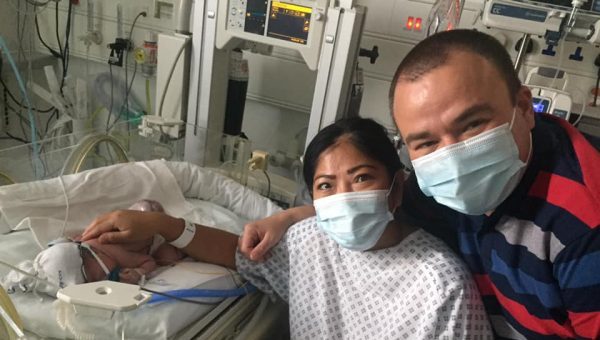“‘You’re having your baby today. You need to have an emergency caesarean. Your baby is not very well.’”
“It was one thing after another, three huge shocks to the system. Days before Sal and I were still discussing what to name our baby boy. We wanted a name that reflected both our cultures but could also be spelt and pronounced. We thought we still had time to decide as it was just under 5 weeks until my due date.
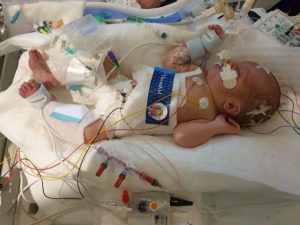
“It was a miserable January morning and we had to make the short drive to Addenbrooke’s Hospital in Cambridge. I had already been to hospital during the early hours of the morning to be checked out after experiencing really painful stomach pains but as the pains continued and I started bleeding, I knew something was wrong and I had to go back to hospital. With the Covid-19 restrictions in place, Sal was not allowed to come into the hospital to be by my side, so he had uncertain and anxious few hours driving to and from the hospital as it was an ever-changing picture. Hours later I was told that I was going to give birth. I rang Sal and told him to come back to the hospital and arranged for my mum to look after Sal’s daughter, Elise.
“Whilst both my baby and I were monitored, my temperature suddenly shot up and I was sick. Sal pressed the call bell and lots of medics ran in. I was told I needed an emergency caesarean and was rushed to theatre while Sal waited to find out what was happening and was eventually brought in. For both mine and the baby’s safety he needed to be born. Minutes passed but there was no sound or movement. I didn’t understand what was happening, I wasn’t handed my baby and I didn’t see him.” (Rachel)
—
“I was sitting right by Rachel’s side watching everything. I could see the doctors gathered around our baby on a table. Time dragged as they resuscitated him, two fingers pumping his little chest. There was a lot of panic in the room and I tried to keep Rachel calm and positive. Rachel kept saying that something must be wrong because we hadn’t heard him cry. Five minutes passed, then ten, then twenty. It took 23 minutes to resuscitate our baby. I saw my son with a little red hat on and his body was limp. Neither of us were sure if that would be the last time we’d see him.” (Sal)
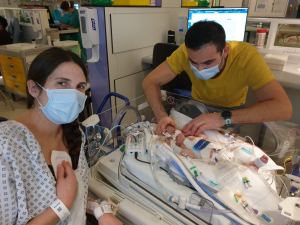
—
“A painstaking evening followed. We were moved to the delivery ward, where we waited for news as we watched other families with their babies, us without ours. Eventually a doctor and a nurse visited to tell us what had happened. Our son had been starved of oxygen for 23 minutes and was at risk of hypoxia. He also had a blood clot in his leg. He was in the Neonatal Intensive Care Unit (NICU) on a cooling mat where his body temperature was lowered to prevent brain damage. He would be gradually warmed back up over the next 72 hours. That night, Sal had to drive home, and I was transferred to another ward. We eventually rang the call bell to ask if I could be moved to the ward as I couldn’t sit there much longer surrounded by mothers, listening to their babies cry when I hadn’t even met mine.
“By midday the following day, I still had no idea what was going on with my baby, so I called NICU for an update and I was told that I could go and see him. I called Sal and asked him to come back to the hospital as I couldn’t face it on my own. I met him in a wheelchair by the lift and we went up together.” (Rachel)
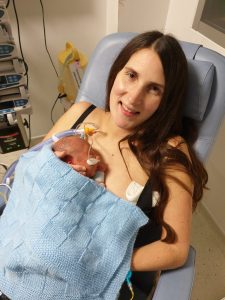
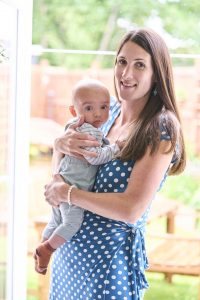
—
“Our son was battered and bruised, lying on a mat and covered in cables. He had three probes attached to his head which were monitoring his brain activity. It was showing none. I stood there grateful that he’d survived but worrying what life he would live.” (Sal)
—
“It isn’t how you expect to see your baby. The prenatal classes unfortunately do not prepare you for complications or aftercare. I felt incredibly grateful that we had chosen Addenbrooke’s for our baby’s birth as it was only now that we found out that Addenbrooke’s is a leading hospital in Neo Natal care. Looking at my baby I saw someone who was so helpless and vulnerable being kept alive because of technology and medicine.
“We started to talk about my discharge from hospital. I was told about the possibility of staying at Chestnut House, a ‘Home from Home’ run by The Sick Children’s Trust. I was still trying to get my head around everything that had happened but it was only when I was told about how valuable these rooms in Chestnut House are that I realised how poorly our baby really was. It was one of five rooms available that we were being offered because our son was seriously ill. I called Sal and he packed clothes for a couple of nights and we arranged for my mum to look after Elise for the foreseeable future.” (Rachel)

—
“When we arrived at Chestnut House, we had to fill out a registration form, which included our child’s name. Until this point, he had been known as Baby Payne. I thought back to all the conversations we had had about names, all those discussions, but now, I just wanted him to be okay. The night before, we had discussed a particular name and as we checked in, we both looked at each other and said ‘Aydin, Aydin Yildiz-Payne.’ It was the most fitting name. Aydin translates in Turkish to mean ‘bright’ and Yildiz (Sal’s surname) means star, therefore translating from Turkish into ‘Bright Star’. He had come back from death and he had seen the light.” (Sal)
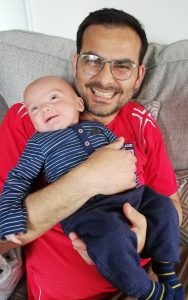
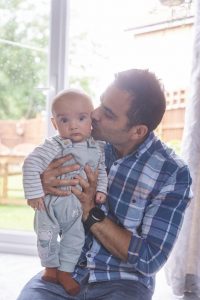
—
“We could not be more grateful for Chestnut House. It made everything so much easier, especially because it meant we could be together at such a crucial time. It wasn’t until five days after Aydin was born that I felt like I had a baby. It was so emotionally draining that I can’t imagine having done it on my own. There was one day where Sal popped back home and I remember going onto NICU to wash the milk bottles and just sobbed. It was exhausting.
“We became robotic for the 13 days we stayed at Chestnut House. Every day we would get up, have breakfast, go see Aydin, come back to Chestnut House for lunch, run, walk, nap or call our parents, then go back up to NICU and come down for dinner. It was easy for us to be there. We were so close to Aydin that it wasn’t stressful and we didn’t have to worry. We didn’t have to worry about travelling to and from the hospital or the mundane things in life like emptying the dishwasher or feeding the cats. We were escaping everyday life and could just focus on Aydin. After three days on the cooling mat, I was finally allowed my first cuddle with Aydin. Then step by step he started reaching milestones. We didn’t even know Chestnut House existed, but it was such an important time to be there together and the ‘Home from Home’ made it possible.
“Every day we spent in Chestnut House the future for our son was uncertain. One day, as Sal and I walked around Addenbrooke’s Hospital, we saw a little boy coming towards us on his bike. Sal and I shared the same thought…Would that ever be Aydin? Would he ever be able to do that?” (Rachel)
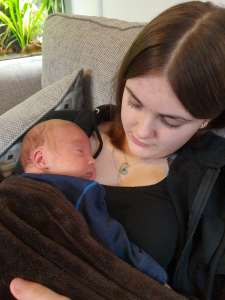
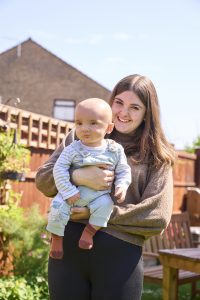
—
“On those afternoons and evenings after a visit to Aydin, I would reassure Rachel. The worry doesn’t ever go when your baby is ill in hospital. It’s a constant and transforms itself from concerns about whether he’ll live, to what sort of life he’ll live. As the days passed, we could see he was getting better but were concerned about the longer term effects of the hypoxia and blood clot. Those days and nights we spent away from Aydin’s bedside we talked and talked. We needed that space at Chestnut House to do that. As Aydin’s start to life was unexpected these questions and worries popped up more and more, but the thing was we didn’t know what the future would hold. No-one does. We spent those nights breaking everything down piece by piece and agreeing we would deal with whatever came our way. No matter what, our son would be loved and looked after the same. (Sal)
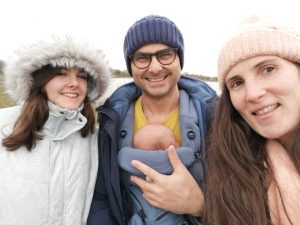
—
“As Aydin was getting better, we started to talk about finally bringing him home. We decided that it was time to leave Chestnut House so that another family who needed it more than us could use it.
“Sal would drop me off in the mornings and join me in the evenings for the following week. Sitting in the hospital for 13 hours one day I came to realise even more just how valuable Chestnut House was. With the COVID restrictions, there was no escape or break away to a café or the food court. The only options were to be in NICU or sit outside in the cold.
“The day before we left, my mum went to the shops and bought lots of items for the communal areas in Chestnut House like kitchen roll, sugar and washing up liquid. Until you’re in that situation you don’t realise all the essentials you need. I wanted to be able to instantly give something back to everyone else staying there, who could be there for weeks and months.
“With the help of the kind nurse, I carefully secured Aydin into his car seat and took him out to the car where his proud dad and big sister Elise waited for him. She held his hand all the way home.
“We’re still not sure what caused Aydin to stop breathing at birth. On his discharge notes, we found out that he also had sepsis, which in itself is very worrying. It still remains a great mystery how and why he was so poorly at birth. Despite everything he’s been through he is doing really well. The doctors and nurses who knew him at birth or read his files cannot believe he is the same baby. (Rachel)
—
“Aydin has done remarkably well. It’s incredible to see where he’s come from to where he is now.” (Sal)

—
“On the day Aydin turned 100 days old, we set up a fundraising page for The Sick Children’s Trust as the charity is so personal and unique to our story. It wasn’t just a roof over your head. Every night we watched meaningless TV to just to switch off and we could do that because we had our room there. We were down the staircase, that’s it, so we never felt like we were leaving him. It was a haven for us to be able to go straight up and down.
“Throughout his time in hospital our family and friends asked us what they could do. We asked everyone to pray for him and to keep thinking positively. They’ve now helped us to raise over £2,000 for the Sick Children’s Trust. It is a true reflection of how worried everyone was and how well loved Aydin is.
“Aydin will be monitored until he is two years old. To look at him now he’s a very bonny baby, smiling and very interested in everything around him. Sal is great at making him smile and laugh, which is the best sound.
“We never imagined this would happen and feel lucky we were in the right place to care for Aydin, but we know other families are hours away from home. When returning to the hospital for Aydin’s 2nd MRI scan, I saw another mum and dad in the NICU Reception who had been there when we were. With the invaluable support Chestnut House gave us, it made a very worrying time so much easier.” (Rachel)
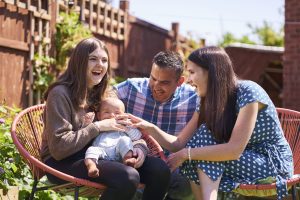
Rachel Payne and Sal Yildiz, Aydin’s parents
